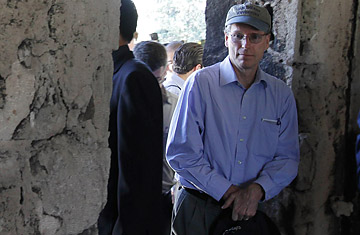
Ambassador Robert Ford tells TIME that while the Assad regime is creating a violent showdown, it's vital that the opposition refrain from turning to arms
Syria's protest movement is largely peaceful, says U.S Ambassador Robert Ford. But the longer President Bashar Assad prolongs his ferocious campaign to suppress the challenge, the greater is the likelihood that Assad's claims to be facing an armed sectarian rebellion will become a self-fulfilling prophecy.
Ford, a career diplomat and Arabist who served three tours in post-Saddam Iraq, tells TIME in a phone call from Damascus, the Syrian capital, that although the pro-democracy movement has not yet turned to violence, some protesters have armed themselves to defend their families and neighborhoods. "There is shooting [by protesters] at Syrian security forces, that is absolutely true," he says. "The government says it, but what the government is not saying, is that their repressive actions are triggering a lot of the violence." Ford adds that unless Assad changes tactics, "the [protester] violence problem will grow worse, as will the problem of sectarian conflict. The Syrian government's policies are driving this and they need to stop it."
There are few indications that Assad intends to heed Ford's advice. Six months of a ruthless crackdown have left at least 2,700 people dead and more than 20,000 in detention (some of whom are feared dead). Some Syrians are now calling for protection from the international community, but like many things related to the fragmented Syrian opposition, there is disagreement as to what that might mean. The spectrum of opinion covers everything from full-throttled NATO intervention on the lines of Libya to creating and protecting and a Benghazi-like haven near the Syrian-Turkey border, deploying international monitors or simply providing greater political support.
"One of the things we've told the opposition is that they should not think we are going to treat Syria the same way we treated Libya," Ford says. "The main thing for the opposition to do is figure out how to win away support from the regime, and not look to outsiders to try and solve the problem. This is a Syrian problem and it needs Syrian solutions."
The first step toward a Syrian solution is to organize the opposition into a united front. The recently formed Syrian National Council (SNC) aims to bring Assad's fragmented foes under a single umbrella. Last week, the influential Local Coordination Committees of Syria, a key grassroots protest group, grudgingly offered its support to the 140-member SNC despite "the way it was formed, and the forces [it] represent[s]." The group was unhappy with the number of Islamists involved in the SNC, and the process by which its members were appointed. On Thursday, the Syrian Revolution Coordinating Union, another street-level organization, threw it weight behind the group.
People power is one element of the opposition; another is military defectors. It's unclear how many men in uniform have switched sides (Ford had no figures), or the reach of the so-called Free Syrian Army led by Colonel Riad al-As'ad, which claims to be operating within Syria. There is anecdotal evidence from videos posted on the Internet that defections are increasing, particularly around the central city of Homs, nearby Hama, the northern area of Idlib and the southern city of Dara'a, where the uprising began in mid-March.
